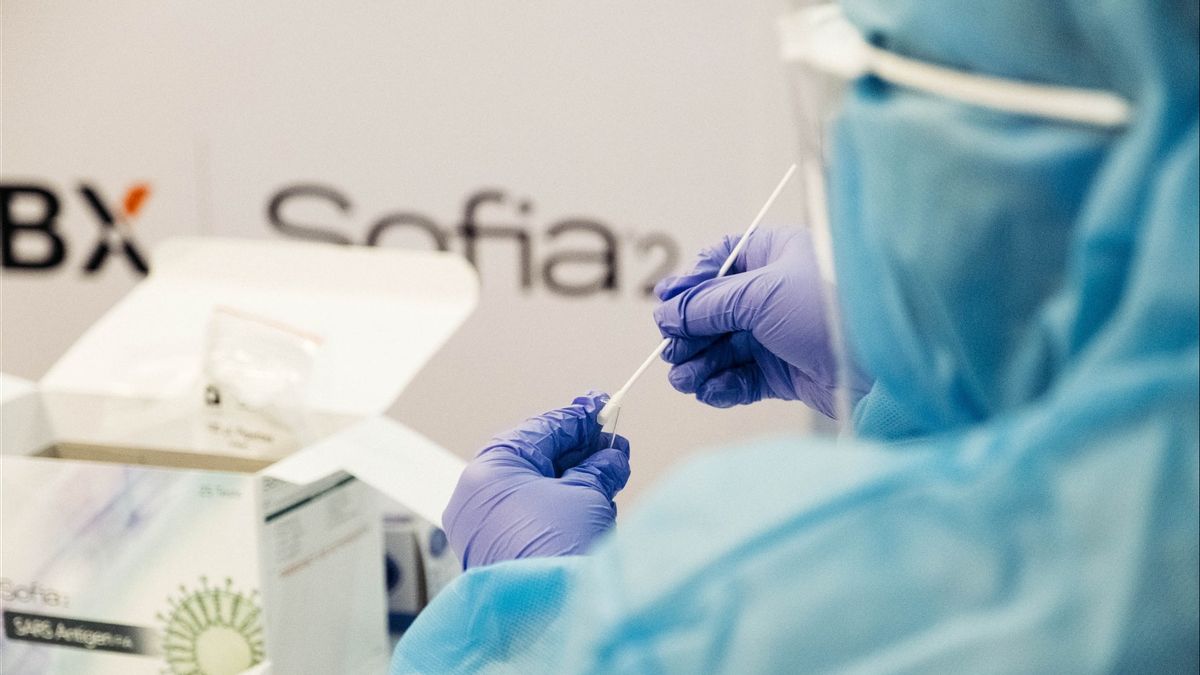JAKARTA - The Chinese government introduced a new protocol for testing or testing for COVID-19, namely the anal swab test. The introduction of a new protocol, the anal swab test, has been carried out in China using state media.
This new protocol was carried out because from the results of a study, it was seen that patients who recovered from COVID-19 then got positive test results after going through a swab test in the lower digestive tract. In fact, a few days earlier, this patient had done a swab test on the nose and throat which later showed negative results.
Furthermore, the Chinese government will carry out this test only on certain groups, such as in quarantine centers.
"If we add this anal swab test, it can increase the level of identifying infected patients," said Li Tongzeng, an infectious disease specialist at Beijing You'an Hospital.
"But of course, considering that collecting anal swabs is not as comfortable as throat swabs, currently only key groups like those in quarantine accept both," he added.
In fact, China tried this anal swab testing procedure on a small group last year whose results were later circulated in research journals.
A group of Chinese researchers published a study in the journal Future Microbiology in August that reported for some recovered coronavirus patients, anal swab samples were still positive for COVID-19 after they tested negative via throat swabs.
When the test was carried out, the Chinese Center for Disease Control and Prevention issued instructions in March 2020. It said the samples that could be used were feces from patients. However, if this is not possible, an anal swab is performed by inserting a cotton-tipped stick three to five centimeters into the rectum.
Sparked a negative reaction from the public in China
For some people, nose and throat swabs are very uncomfortable especially if you have to do anal swabs. According to Chinese netizens who expressed concern on social media Weibo, the test was not only uncomfortable but also embarrassing.
"Everyone involved will be very embarrassed," said one netizen in Guangdong province on Weibo, a Chinese social media platform.
Aside from netizen comments, in a poll on Weibo, 80 percent of respondents said they "couldn't accept" the anal swab method.
Chinese social media was also flooded with comments of distrust and concern about the new testing procedure. "It's difficult for nurses," said one netizen on Weibo.
"We have to really try hard to avoid contracting the coronavirus !!" said other people.
Is it possible to apply in Indonesia?
Researcher at the Indonesian Institute of Sciences (LIPI) Biological Research Center Sugiyono Saputra assessed that anal swab or swab tests can be done in Indonesia.
"It's possible (done in Indonesia, red) but maybe if the anal swab is done by the person concerned," said Sugiyono when contacted by VOI, Thursday, January 28.
According to him, anal swabs can indeed be used to detect SARS-CoV-2 or COVID-19 because this virus can indeed be identified through digestion as well as blood. Moreover, this virus can last longer than in the respiratory tract.
"Usually SARS-Cov-2 can be detected longer in the feces. On average, it's around 17 days, yes, in the respiratory tract, it's about 14 days. But even though it can be detected there longer, its viability is not certain," he said.
Seeing this condition, he considered anal swab can be an alternative. Of course, before doing it independently, the person who will do it is told correctly how the technique is so that the test can be carried out properly and not contaminated.
"So it is different from naso or oro swab which obviously has to be done by someone who is experienced," he said.
A different view was conveyed by an epidemic expert from Australia's Griffith University, Dicky Budiman. He did not deny that COVID-19 could be found in the feces or anus or rectals of sufferers, but he assessed that in general use he still considered that the most appropriate way to test should be a nasopharyngeal or oropharyngeal swab as usual.
"That's better even though it's uncomfortable. Because, if you want to apply an anal swab, of course there must be further study. It is true that if the virus can get lodged in the digestive tract, but efforts to do anal swab also need to consider social, cultural, and comfort aspects patient," said Dicky.
Moreover, he assessed that COVID-19 is a respiratory disease that does have a systemic impact. "But the main transmission is still through the respiratory tract, such as droplets, aerosols, vomiting, and it's all from the nose and mouth," he said.
"So once again, I view this as not too urgent. ... Even though it is detected through dirt, this (incident) is still very, very rare," he concluded.
The English, Chinese, Japanese, Arabic, and French versions are automatically generated by the AI. So there may still be inaccuracies in translating, please always see Indonesian as our main language. (system supported by DigitalSiber.id)













